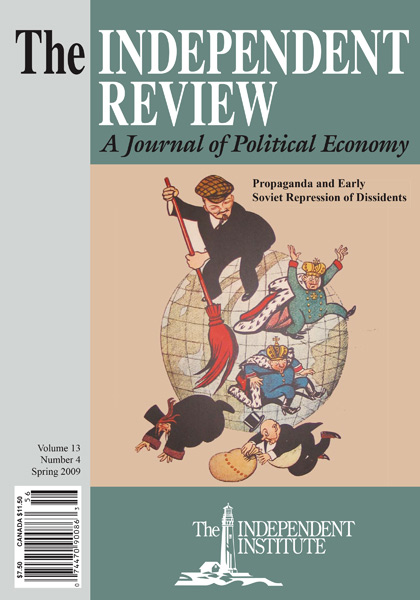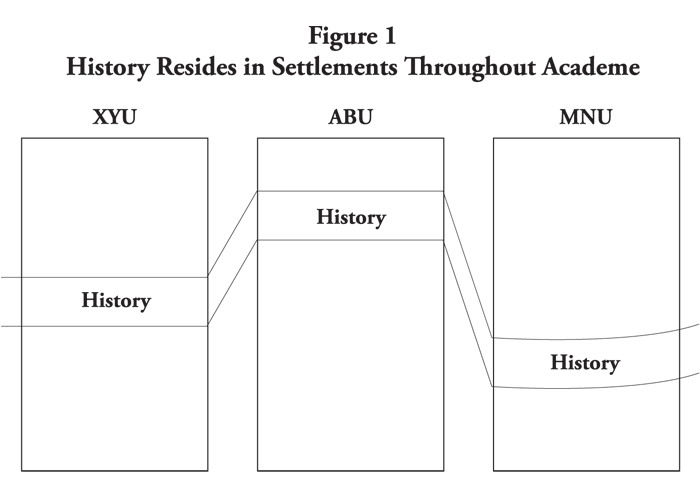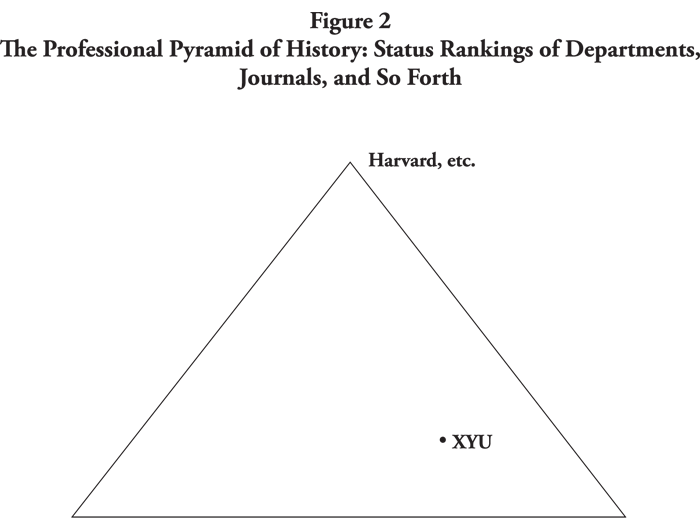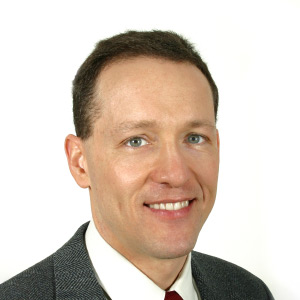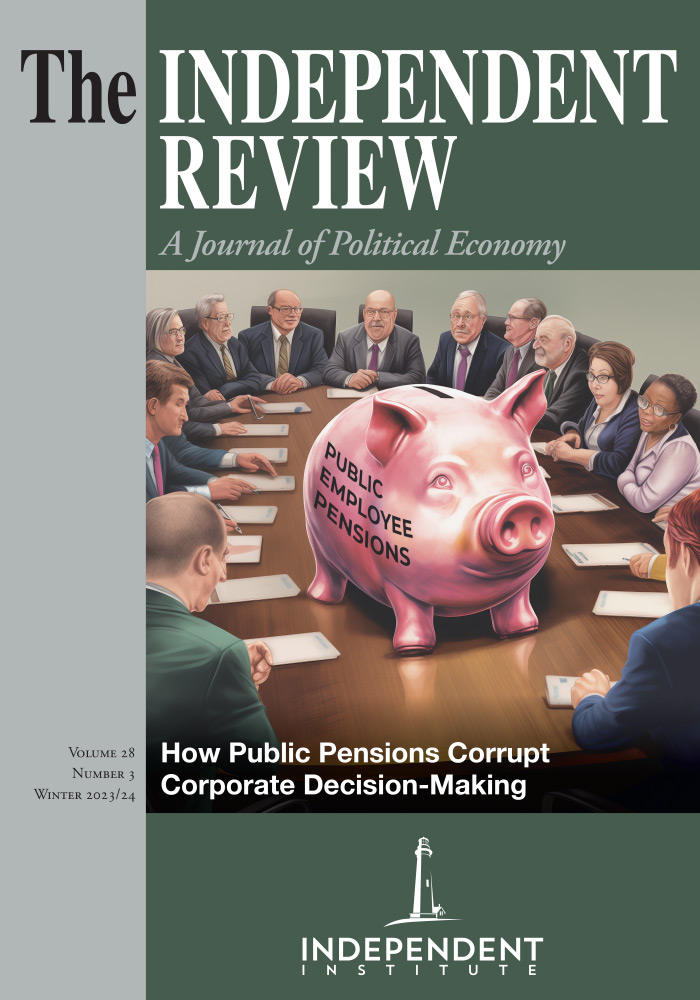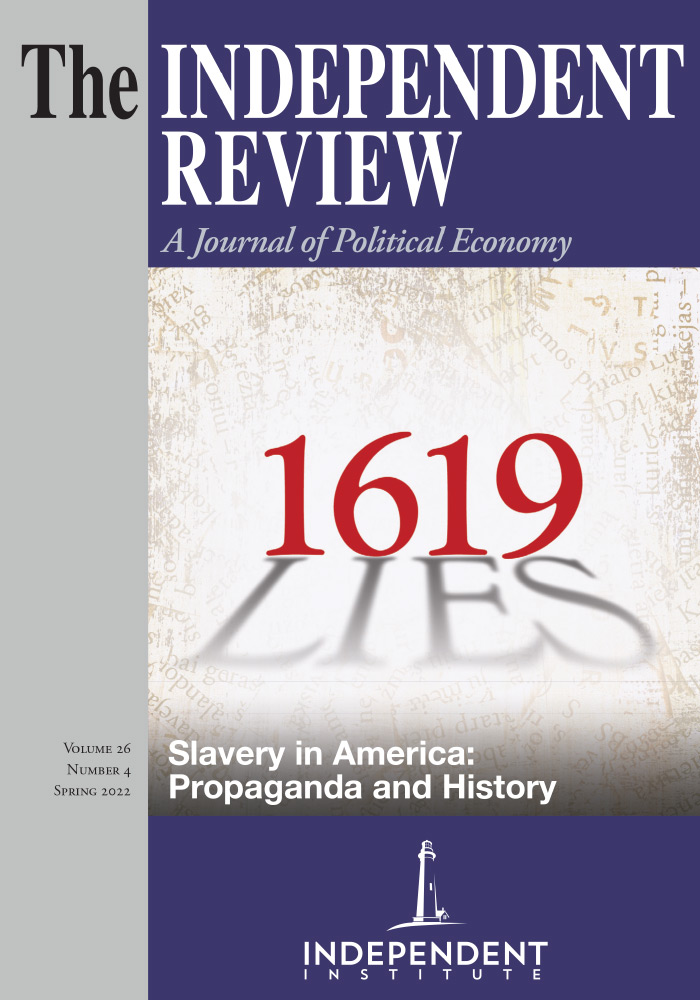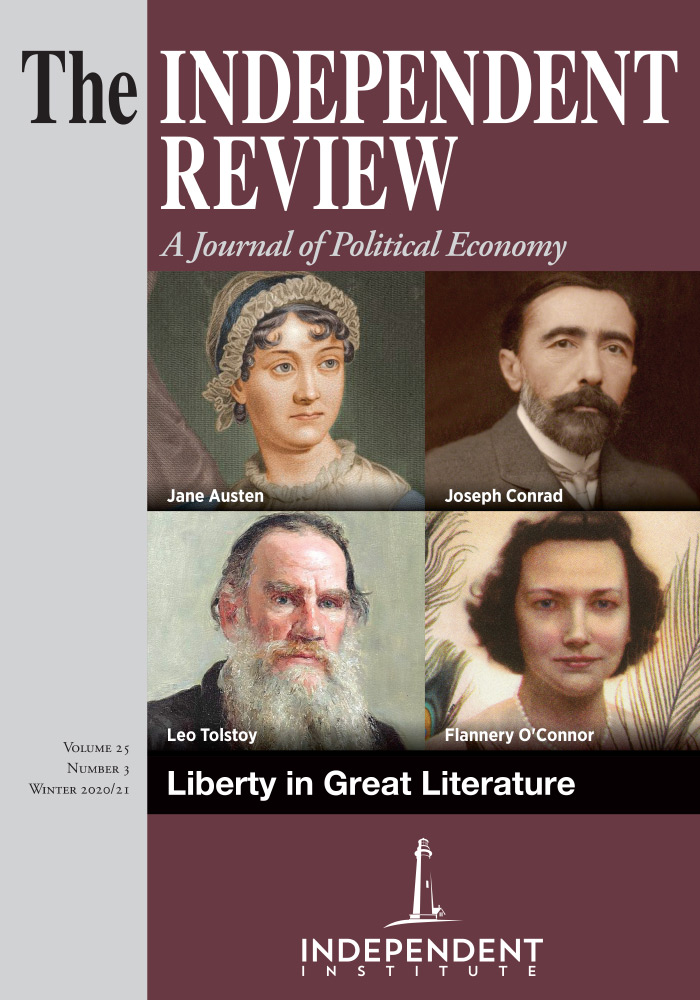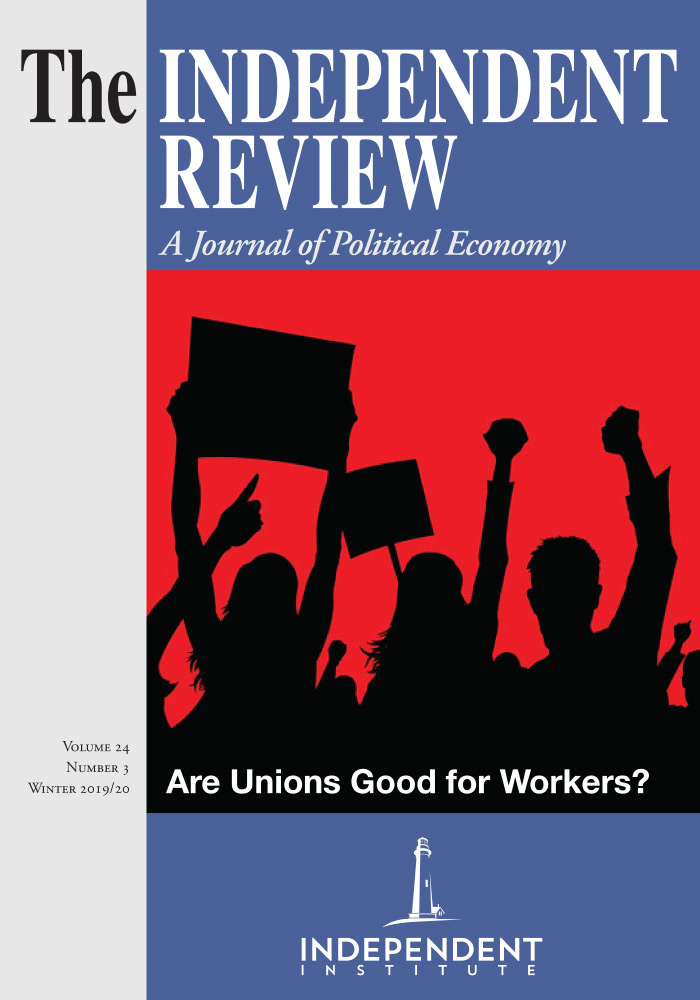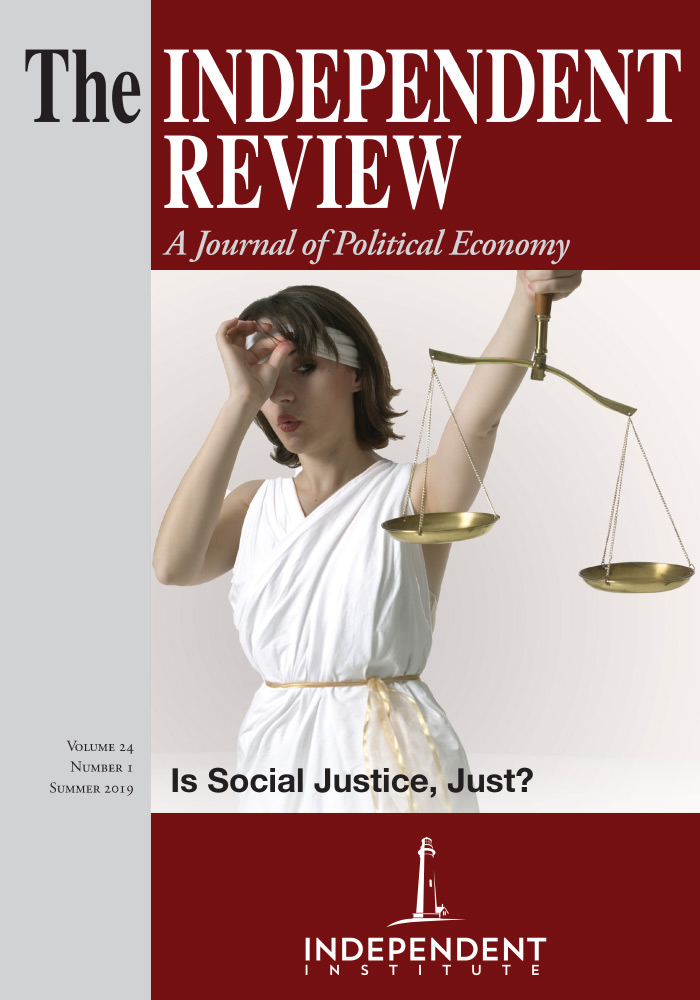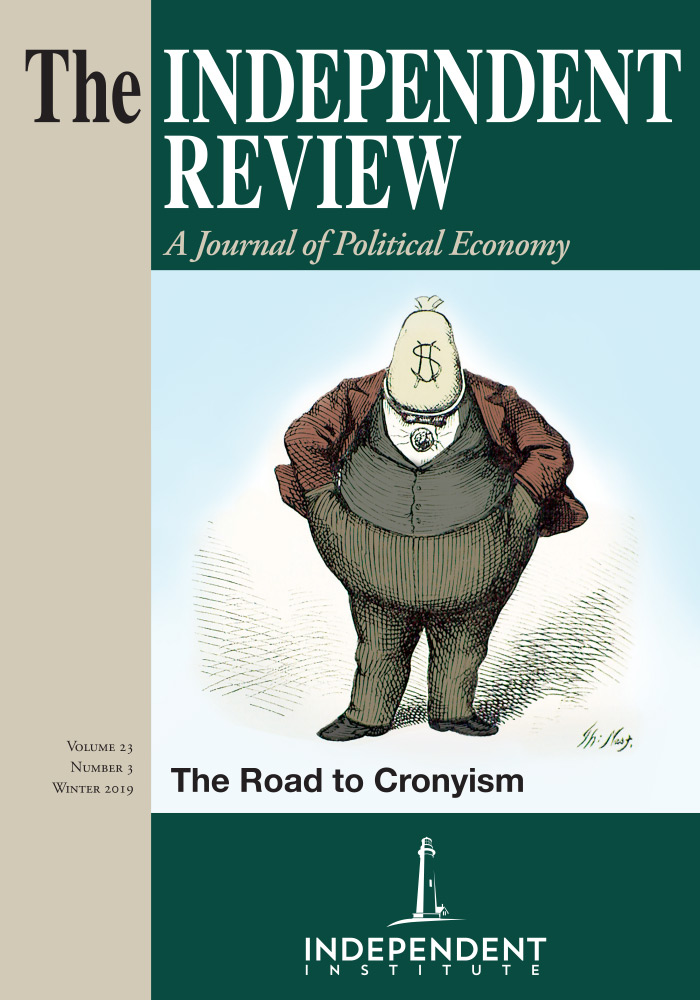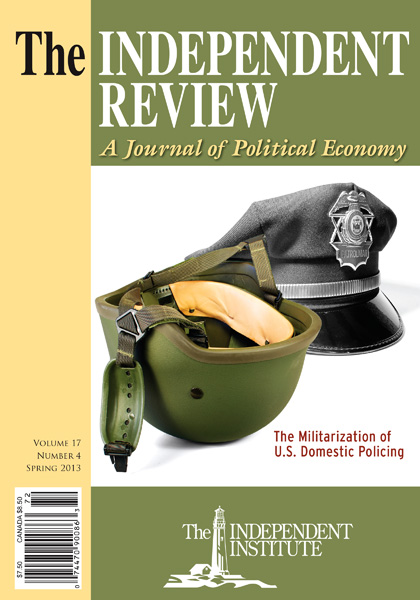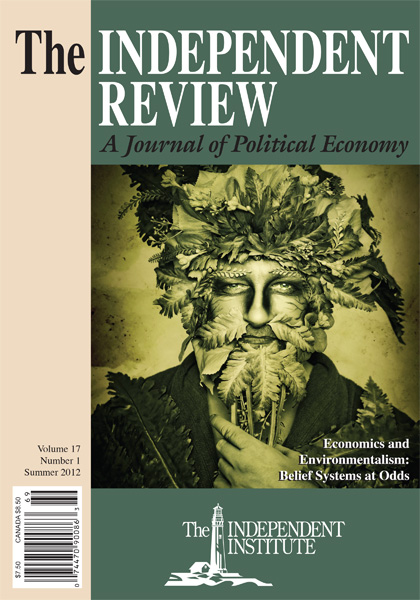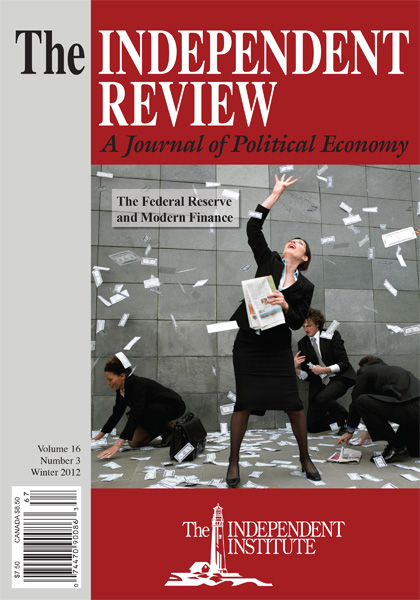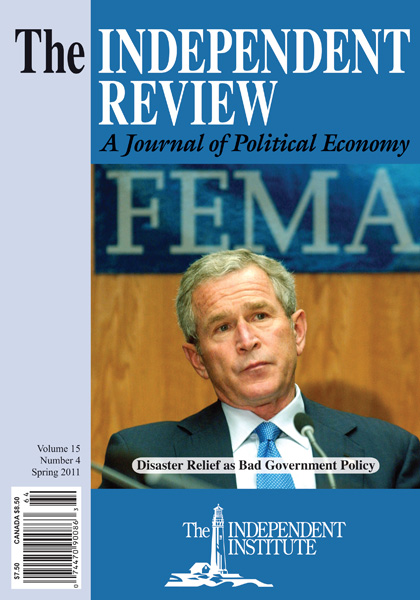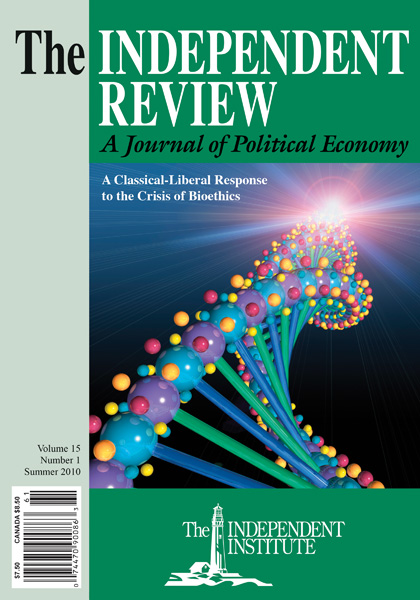Although academia differs from the settings explored by groupthink theorists, it exhibits many of the same tendencies and failings. One result is the relative absence of classical-liberal and conservative viewpoints among humanities and social sciences professors, especially in the more elite departments.
Article
"Generally speaking, we can observe that the scientists in any particular institutional and political setting move as a flock, reserving their controversies and particular originalities for matters that do not call into question the fundamental system of biases they share."
—Gunnar Myrdal, Objectivity in Social Research
"Perhaps we avoid studying our institutional lives because such work is not valued by our colleagues. The academy is, after all, a club, and members are expected to be discreet. Like any exclusive club, the academic world fears public scrutiny. Research is in the public domain. Outsiders might use what the research reveals against the academy."
—Richard Wisniewski, "The Averted Gaze"
"The thousand profound scholars may have failed, first, because they were scholars, secondly, because they were profound, and thirdly, because they were a thousand."
—Edgar Allan Poe, "The Rationale of Verse"
In baseball, fans of different teams can agree on general issues concerning rules, umpiring, and performance evaluation because such matters are separable from support for a specific team. In academia, however, we find that rules and standards for performance are not separable from support for specific beliefs. Ideological sensibilities and commitments in academia tend to be bound up with notions of the whole academic enterprise. Thus, one's positions on how performance should be umpired or evaluated and one's support for a certain "team" are not separable.
We think that discussion of ideology in academia is itself bound to be ideological and that good scholarship calls on us to declare that our principal motivation for the present investigation is our belief that, by and large, professors in the humanities and social sciences are weak in certain sensibilities that we ourselves hold. In particular, classical liberalism has few adherents among academics. In policy terms, classical liberalism favors domestic reform generally in the direction of significantly decontrolling markets and personal choices, reducing the welfare state, and depoliticizing society. A further policy feature of classical liberalism, in our view, is a strong disposition against military entanglements abroad. The current label closest to classical liberal is libertarian, although classical-liberal beliefs are properly understood as somewhat looser and more pragmatic; we also prefer the label classical liberal because it reminds us of liberalism's historical arc.
Ample evidence on the ideological profile of professors in the humanities and social sciences indicates that the dominant, though not monolithic, sensibilities combine social-democratic leanings and support for (or acquiescence to) most domestic government interventions. (We identify modern American "liberalism" as social democracy, a political outlook that readily treads on voluntarist ethics, views the polity as an organization, and therefore advocates the pursuit of collective endeavors, such as equalizing well-being and opportunity.)
Social-democratic views do not always run against the grain of classical liberalism. In our view, however, existing frictions indicate problems with the faculty's ideological profile. Also, even absent friction, the neglect of important classical-liberal ideas itself often counts as a problem. Our analysis rests on the judgment that the relative absence of classical-liberal views among humanities and social sciences professors is unfortunate (but we make no argument for that judgment here).
Our analysis may be adapted by the adherents of other viewpoints who likewise see problems in the faculty's ideological profile and find themselves systematically excluded and marginalized. In particular, conservatives, in a narrow sense that clearly separates them from classical liberals, may use a version of our analysis as a conservative diagnosis of the problem. Our classical-liberal viewpoint, then, is but one of two major viewpoints whose adherents may find the current account especially valuable.
Adapting Groupthink to the Academic Setting
We analyze academic ideology in terms of groupthink. Groupthink analysis examines decision making presupposed to be defective. In that sense, groupthink analysis is pejorative.
In the seminal work Groupthink: Psychological Studies of Policy Decisions and Fiascoes (1982), Irving L. Janis begins by examining a number of well-known fiascoes, including the Bay of Pigs, escalation in Vietnam, and Watergate—episodes that came to be judged fiascoes even by those responsible for them. Janis starts with defectiveness and seeks to explain the absence of correction. He defines groupthink as "members' strivings for unanimity overriding their motivation to realistically appraise alternative courses of action." He declares the term's "invidious connotation"(9).
Paul 't Hart, who developed the Janis tradition in Groupthink in Government: A Study of Small Groups and Policy Failure (1990), calls groupthink "excessive concurrence-seeking," a behavior that explains "flaws in the operation of small, high-level groups at the helm of major projects or policies that become fiascoes," such as the Iran-Contra affair (7, 4), and he reviews several applications of groupthink research (12h15). Diane Vaughan's (1996) discussion of the space shuttle Challenger disaster, which involves both bottom-up and top-down organizational errors, can be said to occupy an intermediate position between traditional Janis-Hart analysis and the analysis offered here.
The groupthink theorist wants to gain standing as a social theorist and therefore wants to avoid unnecessary controversy. Accordingly, groupthink theorists—at least those like Janis and Hart—have focused on episodes where, in hindsight, the judgment of failure (or error) is uncontroversial. The need for uncontroversial judgment is one reason why the scope of groupthink applications has been quite limited.
In this article, we apply groupthink theory to a setting where the presupposition of failure is anything but uncontroversial. Academe is quite different from the settings groupthink theorists have examined. We suggest, however, that given the presupposition of failure, central mechanisms in academe make it possible to adapt groupthink theory to this setting. We try to make plausible the idea that if academic groups were caught up in defective thoughts, the defectiveness would be resistant to correction. We explain persistence, or the lack of correction. We do not consider "how the problem got started," in part because of space limits and in part because there never was an Eden.
To be sure, we ought to be cautious about using groupthink to interpret academic ideology in the humanities and social sciences. The groupthink literature in the tradition of Janis and Hart examines mostly the belief processes of policymaking groups. The cases usually have the following features:
- The group is small.
- The group is fairly neatly defined—a group of "insiders."
- The group is chief based, with highly centralized decision making.
- The group is concerned about security leaks or other constraints that lead it to put a premium on secrecy.
- The group acts under great stress.
- The group makes decisions that run great risks and involve huge possible dangers.
- The group is dealing with an issue of great immediacy and exigency.
- The group's bad beliefs are specific to the decision at hand.
- The bad beliefs are shallow; they are not about issues of identity.
- The potential for eventually admitting defectiveness usually exists.
In all of these features, policymaking groups differ significantly from academic groups. The latter—whether colleagues in a university department or the leadership at a prestigious journal or association—are larger, less well defined, much less chief based, much less specific-action oriented, and much less subject to stress, urgency, risk, and danger. Their bad beliefs are much deeper, more complex, and more incorrigible—more in the nature of moral, political, and aesthetic values. These differences make academic groups more diffuse and variegated in purpose.
Despite these differences, we see basic similarities between Janis-Hart groups and academic groups. Both types of groups hold defective beliefs, and both tend toward concurrence seeking, self-validation, and exclusion of challenges to core beliefs. Finally, mechanisms in academe work to create an "in-group" that is insular, self-perpetuating, and self-reinforcing.
Departmental Majoritarianism
Let us imagine a university called XYU whose inner workings resemble those of other institutions—which is to say, they are hierarchical in purpose, structure, and authority. XYU is an organization led by a provost, deans, and so on. Beneath the administration come the academic departments.
Actors in an organization subdivide labor. In most nonacademic organizations, the bosses can scarcely tamper in detail with tasks assigned to subunits; rather, they look for results that advance the organizational mission. Academe has the same necessary subdivision and delegation, but a much fuzzier sense of organizational mission. Furthermore, oversight is more problematic in academe because scholarship is inherently specialized and embedded in the scholarly community. Even Adam Smith ([1776] 1981), who criticized academia, emphasized that any "extraneous jurisdiction" over substantive issues of teaching "is liable to be exercised both ignorantly and capriciously."[1] The upshot is that administrators generally rubber-stamp departmental decisions. Although the department may appear to be structurally "under" the administration, in practice it is left to decide the important questions (about hiring, firing, promotion, teaching, research, graduate student training, and so on), nor is it guided in matters of an ideological nature.
The most important departmental decisions involve the hiring, firing, and promotion of tenure-track faculty. Such decisions come down to majority vote. Although the chair exercises certain powers, committees control agendas, and so on, the central and final procedure for rendering the most important decisions is democracy among the tenure-track professors—or departmental majoritarianism.
Most intellectuals develop ideological sensibilities by the age of twenty-five or thirty (Sears and Funk 1999), and afterward they rarely revise them substantially. Intellectual delight and existential comfort are taken not in reexamining prior decisions, but in refining and developing ideas along the lines already mastered (Ditto and Lopez 1992; Nickerson 1998). Professors are likely to respect scholars who pursue questions similar to their own and who master similar modes of thought. They are not likely to respect scholars who pursue questions predicated on beliefs at odds with their own. Indeed, if a scholar is engaged in a task that might threaten a colleague's sense of self, he may give rise to personal distress and create acrimony between them. Professor A might lose standing and credibility with students if a colleague, Professor B, who is teaching those same students in a different course, exploded some of the premises of Professor A's course materials, lectures, and writings.
In hiring a new member of the department, most existing members will tend to support candidates who share their fundamental beliefs, values, and commitments. Indeed, one of a scholar's prime responsibilities is to navigate through the big issues, make judgments and commitments, and move on. These judgments are not separate from science or scholarship, and scholars rightly may say: "If Candidate A has judged differently on fundamentals, then he has exhibited bad scholarly or scientific judgment." This judgment cannot be disposed of. No one has a way to step outside of it. Discriminating on the basis of differences in fundamentals, therefore, cannot be condemned in the abstract as irresponsible scholarship. We all discriminate on the basis of ideology, and—again in the abstract—doing so is perfectly justifiable.
As noted previously, the academic setting differs in certain regards from the settings groupthink theorists have studied. Yet some of these differences may compensate for each other. In academia, the focus of belief and action is not a crucial policy decision, such as invading Cuba. Therefore, there is no corresponding secrecy and necessary separation from regular channels of discourse. Another difference, however, has to do with the depth or personal significance of the beliefs in question. In academia, the beliefs are deep seated and connected to selfhood and identity. For that reason, protecting and preserving them have high personal stakes. The existential significance of ideological beliefs in some respects compensates for the fact that personnel and other decisions in academia are otherwise mundane and socially inconsequential.
In context, people know they must judge and act on deep sensibilities, and they know, if only tacitly, that no real scandal attends their doing so. Theories of group formation and social dynamics tell us that social groups tend to seek and attract newcomers like themselves (McPherson, Smith-Lovin, and Cook 2001), screen out and repel misfits (Allport 1954; Brewer 1999), and mold the unformed in their own image (Katz and Lazarsfeld 1955, 62–63; Moscovici 1985).[2] These tendencies are rooted in human nature.
Suppose a department must hire a new member, and 51 percent of the current members share a broadly similar ideology—say, social-democratic progressivism or conservatism or classical liberalism/libertarianism. Moreover, they believe that one must broadly conform to that ideology to be a good colleague and a good professor. What happens? The department members hire someone like them. The 51 percent becomes 55 percent, then 60 percent, then 65 percent, then 70 percent, and so on. As Stephen Balch (2003) and others have noted, majoritarianism tends to produce ideological uniformity in a department.
The syndrome does not depend on the ideology's identity. The George Mason University Department of Economics is led by and dominated by classical liberals. Some would identify themselves as conservative. Only a few would identify themselves as liberal (in the current U.S. sense). A case of ideological discrimination? The classical liberals and conservatives think that being an interventionist in the manner of, say, Kenneth Arrow, Joseph Stiglitz, Paul Krugman, or Dani Rodrik reveals failings in economic judgment. Many George Mason economists regard undue confidence in government and politics as bad science, and they consider arcane work a scientific failure to deal with the most important things.[3]
We speak of tendency, not of lockstep uniformity. Some degree of variation will be normal and acceptable—for example, ongoing internal tensions prevail between the more radical Left and the establishment Left. In any case, the tendency toward uniformity is not the whole story. An ideological oddball might be well liked and considered unthreatening, perhaps because he is meek or does research in an arcane mode that renders him effectively irrelevant to fundamental issues. Moreover, departments usually have an ethic of consensus. Colleagues are human beings, and they are stuck with each other. They usually seek to avoid acrimony and aggravation. The majority does not steamroll the minority's interests. The consensus factor works toward blandness in personnel matters; the majority advances job candidates who belong to their camp, but not in a strident or outspoken way. The consensus factor moderates the majority's actions, but it does not undo the tendency toward uniformity. Its main effect is probably to pull that uniform character toward blandness—that is, merely toward a presumption in favor of the conventional policies and opinions of whatever major party the majority favors.
Outsiders often think that the classical-liberal or conservative professor needs only to get tenure in order to ensure his professional success and psychic well-being. But imagine building a career through graduate school and pretenure employment (about eleven years) before feeling able to be yourself. You then find you are no longer yourself—not that your ideological views have changed much, but that any ideological motivation has likely receded. You "go native," as they say. Your twenties and early thirties are a crucial period of development, and these developments cannot be reversed. Moreover, even after being granted tenure, you depend on department colleagues for pay raises, resources, teaching assignments, scheduling, promotions, recognition, and consideration. Tenure alone is clearly not a refuge for the departmental miscreant.
Because of departmental majoritarianism, each department tends toward ideological uniformity, perhaps watered down. Some XYU students lament that the history department lacks classical liberals or conservatives. Citizens at large, however, may hope that the public conversation among prestigious academic historians includes such viewpoints, so that perhaps one can shop for a university that has a history department with a more appealing ideology.
The Professional Pyramid
Imagine a college freshman named Sarah who comes from a family that admires thinkers such as Adam Smith, F. A. Hayek, and Milton Friedman. She goes off to XYU. After her first year, she informs her parents that the humanities and social science departments seem to be dominated by social democrats. Her parents grumble, but what's done is done. However, they have another child looking toward college who wants to study history. This time, they shop more carefully and investigate the history departments at different schools. Everywhere they see signs of a social-democratic bent, and they wonder why it prevails so widely.
The principal explanation of the uniformity across campuses lies in understanding what the individual history department is at an existential level. The XYU history department, for example, is not so much a subunit of XYU as it is a village of the larger tribe, history as a profession. History the profession has a settlement at XYU, the XYU history department. As professional researchers, members of that department find much of their meaning and validation in belonging to and serving the history profession. They may share a roof with philosophers, linguists, and so on, but they almost never engage in scholarly discourse with them. Rather, their scholarly life takes place within the tribe of history, which resides in settlements situated laterally across geography and physical institutions (see figure 1). History is the "invisible college" to which most historians principally belong. The department is more a creature of history as a profession than of XYU.
Again, the XYU history department has to make decisions about hiring and other matters. They are microdecisions. In making and justifying these decisions, department members draw on the tribe's macronorms and values. The micro and macro are intimately and thickly interconnected.
In structure, the tribe is pyramidal, with the elite at the apex and widening echelons at each lower step (see figure 2). Position within the pyramid depends on focal, conventional rankings of key institutions, notably academic journals, departments, publishers, citations, grants, awards, and other markers of merit. Individual scholars, aside from playing specific roles (as teacher, writer, journal editor, and so forth), help to organize the tribe by performing activities that determine or affirm rank, such as writing letters, praising work, and citing research, and they too are subject to ranking. All the usual metrics are intertwined and mutually reinforcing.
Research is highly specialized, and the tribe is broken down into subfields. U.S. history, for example, might be broken down by period, by aspect (social, cultural, economic, gender, political, legal), by mode of research, by theme or character. Prestige and eminence are determined within the subfield, a kind of club within the tribe. The clubs constitute the tribe, just as agencies and branches constitute the government. Each club sorts people with overt reference to pedigree, publication, citations, and letters of reference. The club controls these filters and then applies them to itself. It controls the graduate programs and journals. By spawning and hiring new recipients of Ph.D. degrees, the club reproduces itself.
The academic job market is unlike the market for waiters or cab drivers. In all but the literal sense, one history department "sells" its newly minted Ph.D. holders to other history departments. The consumers (history departments), the producers (other history departments), and the products (newly minted history Ph.D. holders) are all historians. Waiters and cab drivers are accountable to their employers, who are accountable to consumers. Historians are accountable for the most part only to other historians. Meanwhile, they are spending funds drawn from taxpayers, tuition payers, foundations, and charitable donors.
The pyramid of club and tribe is self-validating. Who else can possibly provide the validation? The pyramidal structure is to a great extent in the nature of the beast. A department's microdecisions are decisions about friends, colleagues, enemies, friends of friends, students of mentors, and so on. If it wants to look beyond itself to make and justify its decision, it looks to the higher echelons of the profession, as an individual may look to heritage.
This allegiance reflects in part a sincere faith in the tribe—after all, we would agree that the official rankings express genuine quality in some important dimensions of scholarship. But in part it reflects a practical need to establish commonly understood standards and practices. The tribe's standards are focal points around which expectations are mutually coordinated and consensus is tolerably achieved (Whitley 1984). Without an encompassing standard, a discipline has no prospect of conducting itself as a coherent enterprise. The precept "history is what historians do, and historians are those with history degrees and appointments" may not be intellectually satisfying, but at least it keeps the wheels turning fairly smoothly.
Reliance on the tribe's standards to decide on jobs, pay, security, teaching loads, grants, research assistants, and so forth is so entrenched and ingrained that the players come to value the standards for their own sake. Having an article accepted at a top journal brings concrete gains and prestige, regardless of the article's or journal's intrinsic value. Functionality depends on internalizing the discipline's norms.
Now, suppose that the departments and journals at the pyramid's apex adhere to ideology j. In that case, no internal conflict occurs, and any dissent from below is safely ignored. Indeed, inferiors will be inclined to refrain from criticism because they depend on their superiors' acceptance and endorsement. Microdecisions throughout the pyramid will tend to follow those at the apex. In addition to such concurrence mechanisms, there is propagation: the apex produces Ph.D. holders and places them well.
Consider a conventional ranking of two hundred economics departments worldwide, where the top thirty-five are treated as the apex (Klein 2005, 143). In these top thirty-five departments, more than 90 percent of faculty received their Ph.D. degree from the same thirty-five departments; the top is almost entirely self-regenerating. According to the regression line, the department ranked one hundredth would have about 65 percent of its faculty from the top thirty-five. Departments farther down the pyramid are generally much smaller, so the top thirty-five departments train and mentor the people who populate most of the top two hundred departments. The profession, especially at the higher echelons, consists for the most part of people directly indebted to and personally loyal to those at the apex.
Yet these results do not fully capture the domination by the top departments, which also have vastly disproportionate influence in regard to journals, grants, second-generation degrees, and so on (Klein 2005, 144–45). In sociology, for instance, Val Burris documents the extraordinary power that the leading U.S. departments exercise:
Graduates from the top 5 departments account for roughly one-third of all faculty hired in all 94 departments. The top 20 departments account for roughly 70 percent of the total. Boundaries to upward mobility are extremely rigid. Sociologists with degrees from non–top 20 departments are rarely hired at top 20 departments and almost never hired at top 5 departments. . . .
The hiring of senior faculty by prestigious departments is even more incestuous than the hiring of new PhDs. . . . Of the 430 full-time faculty employed by the top 20 sociology departments . . . only 7 (less than 2 percent) received their PhD from a non–top 20 department, worked for three or more years in a non–top 20 department, and, after building their scholarly reputations, advanced to a faculty position in one of the top 20 departments. (2004, 247–49, 251)
In the field of law, Richard Redding finds: "A third of all new teachers [hired in law schools between 1996 and 2000] graduated from either Harvard (18%) or Yale (15%); another third graduated from other top-12 schools, and 20 percent graduated from other top-25 law schools" (2003, 599).
Because of the mechanisms that operate within disciplines—propagation, "follow the apex," and "freeze-out"—if the apex embraces ideology j, it will tend to sweep that ideology into positions in every department all the way down the pyramid. We are oversimplifying, but perhaps not much. Some dissent will occur, but heterodoxy focuses on criticizing the mainstream pyramid because the pyramid remains the gravity well of group practice and individual ambition. As for any central power, people fight over its exercise and distribution. If parallel pyramids are erected, they generally are either ignored or co-opted into the fringes of the official pyramid, altering its character somewhat. The professional pyramid and departmental majoritarianism function together effectively to exclude scholars opposed to ideology j, especially from the highest-ranked departments. This process may explain why in most fields of the humanities and social sciences, no predominantly classical-liberal institution has a significant professional standing.
Academic Groupthink
Although academia differs from the settings explored by groupthink theorists, it exhibits many of the same tendencies and failings. Irving Janis provides a summary table of antecedent conditions and symptoms of groupthink (1982, 244). We list them here verbatim (in boldface), omitting a few items that do not fit the academic application (such as "Provocative Situation Context"). We add (in regular type) our suggestions of how these conditions and symptoms operate in academia. We sketch a narrative of increasing social-democratic groupthink from about 1972, when the ratio of Democrat to Republican in the humanities and social sciences (excluding two-year colleges) was around four to one, to the present, when it is around eight to one (Klein and Stern 2005, 264).
ANTECEDENT CONDITIONS
Decision Makers Constitute a Cohesive Group. The professional pyramid and departmental autonomy tend toward group cohesiveness.
Structural Faults of the Organization
Insulation of the Group. No one outside the pyramid is qualified to judge the group. Insiders safely ignore outside opinion.
Homogeneity of Members' Social Background and Ideology. Sorting and molding mechanisms produce ideological homogeneity, both throughout the pyramid and within the individual department. In 1972, the social science and humanities faculty was preponderantly Democratic. Once the skew became too great, it tumbled into a self-reinforcing process. Among professors, the Democratic tent is significantly narrower in policy views than the Republican tent (Klein and Stern 2005, 272).
OBSERVABLE CONSEQUENCES
Symptoms of Groupthink
Type I: Overestimation of the Group
Illusion of Invulnerability. Academics feel that those outside the pyramid lack knowledge and credibility, and that those inside the pyramid would not dare to become renegades.
Belief in Inherent Morality of the Group. Individuals choose to join an academic profession. Many say they do so to serve scholarship, learning, science, truth, society, and so forth. Belonging is infused with dedication and purpose. It is part of one's identity. Heightened uniformity makes the group overconfident. Members take their ideas to greater extremes. Facing less testing and challenge, the habits of thought become more foolhardy and close-minded.
Type II: Closed-Mindedness
Collective Rationalizations. Academic professions develop elaborate scholastic dogmas to justify the omission of challenging or intractable ideas. Discussions that depart the forty-yard line and explore substantially different arrangements are dismissed as "normative," "ideological," or "advocacy." Classical-liberal formulations of voluntary versus coercive action would be dismissed as illusory and ideological. In economics, where mathematical model building dominates the theoretical literature, important facets of knowledge and discovery, including the virtues of free markets, have little chance to be noticed or studied. As Janis writes, "When a group of people who respect each other's opinions arrive at a unanimous view, each member is likely to feel that the belief must be true. This reliance on consensual validation tends to replace individual critical thinking and reality-testing" (1982, 37).
Stereotypes of Out-Groups. Janis writes: "One of the symptoms of groupthink is the members' persistence in conveying to each other the cliché and oversimplified images of political enemies embodied in long-standing ideological stereotypes" (1982, 37). It is not uncommon for social-democratic academics to lump their critics together as "conservatives" or "the Right," and, as Mark Bauerlein (2004) notes, to assume that these critics are represented by the likes of George W. Bush, Ann Coulter, Rush Limbaugh, Bill O'Reilly, and Sean Hannity. Few social-democratic academics engage the classical-liberal alternative offered by Adam Smith, F. A. Hayek, Milton Friedman, or Richard Epstein.
Self-Censorship. The pyramid functions much like a genteel society in which criticism is muted. Particularly because of norms of consensus, it is impolitic to alienate colleagues. Going along to get along, dissidents and miscreants tend to suppress their disagreements with the dominant view, leading to what Timur Kuran (1995) calls "preference falsification."[4]
Direct Pressure on Dissenters. In Janis's work, an insider who dissents is pressed to toe the line. In academia, the dissenter is more likely to be frozen out. As the group's beliefs become more defective, the group becomes more sensitive to tension, more intolerant of would-be challengers and miscreants. This development leads to tighter vetting and expulsion, more uniformity, more intellectual deterioration, and more intolerance. Stanley Rothman, Robert Lichter, and Neil Nevitte (2005) provide evidence that conservative scholars hold less academically prestigious positions than their peers, controlling for research accomplishment, and we show elsewhere (Klein and Stern 2005, 275) that Republican-voting scholars who are members of major academic associations are more likely than their peers to have landed outside of academia (especially in sociology, history, and philosophy).
Symptoms of Defective Decision Making
Incomplete Survey of Alternatives
Incomplete Survey of Objectives
Failure to Reappraise Initially Rejected Alternatives
Poor Information Search, Selective Bias in Processing Information at Hand
All of the foregoing items from Janis's table can be applied to social-democratic and forty-yard-line blinders and precepts. Classical-liberal and conservative ideas are often ignored, dismissed by way of elaborate dogmas, or treated only in false caricature.
Some Examples
Perhaps the clearest way to illustrate how we see the problem of social-democratic groupthink in the humanities and social sciences is to perform a thought experiment. Imagine a doctoral student who unabashedly holds classical-liberal ideas. Ask yourself whether such a student would be able to find warm support in the elite departments of political science, sociology, history, and so forth. Ask yourself whether the student, no matter how solid his research, would be likely to win grants, have his articles published by the most respected journals, and succeed on the academic job market.
Consider some specific claims that such a student's research might explore:
- FDR and the New Deal prolonged the Great Depression.
- American labor laws, such as union privileges, have never been justified and have hurt the poor.
- The K–12 school system in the United States can be fruitfully analyzed as a socialist industry, and it exhibits most of the characteristic failings of socialism.
- Most mandated recycling programs are a waste.
In our view, such claims are more than merely plausible, and it would be easy to multiply the examples. Research of this type is not completely unheard of within the tribe of economics,[5] but especially in other disciplines a new Ph.D. holder who develops such claims and substantiates them thoroughly would fail on the job market and in the "good" journals. The lack of tribe credentials and seals of approval would justify microdecisions to freeze out such a scholar.
Consider some broader theses in philosophy, politics, sociology, anthropology, and history, many of which can be pursued empirically:
- "Social justice" makes no sense (as argued by Hayek).
- "Social justice" is an atavism (as argued by Hayek).
- Government intervention, such as the minimum-wage law, is coercive; the social-democratic state is a society of wholesale coercions.
- Leading features of democratic processes include ignorance, superficiality, and systematic biases.
- Democracy often treads on liberty, decency, and prosperity.
- The rise of social democracy since the late nineteenth century may be fruitfully regarded as a subversion of liberalism, specifically in that it promotes a view of the polity as a kind of organization.
- Since 1880, intellectuals have altered the meaning of many key terms of the liberal lexicon—freedom, liberty, liberalism, justice, rights, property, rule of law, equity, and equality—so as to undermine their power in opposition to a social-democratic worldview.
- Organizational integrity varies positively with the voluntary basis of participation and funding—that is, government organizations tend to lack organizational integrity because they do not face the threat of loss of support based on voluntary participation.
- The distinction between voluntary and coercive action (or laissez-faire versus interventionism) provides a better framework for analyzing political views and public opinion than a distinction between liberal and conservative.
These ideas are anathema to the tribes of such disciplines.[6] Groupthink keeps them out of the prestigious journals and course curricula. Some of these fields have alternative centers and associations that might pursue such ideas, but these centers and associations generally remain peripheral to the professional pyramid. Classical-liberal and conservative scholars know the score, and if they nonetheless try to get on in academia, they find themselves watering down their ideas and cloaking or misrepresenting who they really are.
References
Allport, Gordon W. 1954. The Nature of Prejudice. Reading, Mass.: Addison-Wesley.
Balch, Stephen H. 2004. Toward a Reconstitution of Academic Governance. Academic Questions 17, no. 1 (winter): 67–72.
Bauerlein, Mark. 2004. Liberal Groupthink Is Anti-intellectual. Chronicle of Higher Education, November 12.
Brewer, Marilynn B. 1999. The Psychology of Prejudice: Ingroup Love or Outgroup Hate? Journal of Social Issues 55: 429–44.
Burris, Val. 2004. The Academic Caste System: Prestige Hierarchies in PhD Exchange Networks. American Sociological Review 69 (April): 239–64.
Davis, William L. 2004. Preference Falsification in the Economics Profession. Econ Journal Watch 1, no. 2: 359–68.
Ditto, Peter H., and David F. Lopez. 1992. Motivated Skepticism: Use of Differential Decision Criteria for Preferred and Non-preferred Conclusions. Journal of Personality and Social Psychology 63: 568–84.
Hart, Paul 't. [1990] 1994. Groupthink in Government: A Study of Small Groups and Policy Failure. Baltimore: Johns Hopkins University Press.
Janis, Irving L. 1982. Groupthink: Psychological Studies of Policy Decisions and Fiascoes. 2d ed. Boston: Houghton Mifflin.
Katz, Elihu, and Paul Felix Lazarsfeld. 1955. Personal Influence: The Part Played by People in the Flow of Mass Communications. New York: Free Press.
Klein, Daniel B. [1994] 1998. If Government Is So Villainous, How Come Government Officials Don't Seem Like Villains? In 3 Libertarian Essays, by Daniel B. Klein. Irvington, N.Y.: Foundation for Economic Education.
———. 2005. The Ph.D. Circle in Academic Economics. Econ Journal Watch 2, no. 1 (April): 133–48.
Klein, Daniel B., and Charlotta Stern. 2005. Professors and Their Politics: The Policy Views of Social Scientists. Critical Review 17, nos. 3–4: 257–303.
———. 2006. Sociology and Classical Liberalism. The Independent Review 11, no. 1 (summer): 37–52.
———. 2007. Is There a Free-Market Economist in the House? The Policy Views of American Economics Association Members. American Journal of Economics and Sociology 66, no. 2 (April): 309–34.
Kuran, Timur. 1995. Private Truths, Public Lies: The Social Consequences of Preference Falsification. Cambridge, Mass.: Harvard University Press.
McPherson, Miller, Lynn Smith-Lovin, and James M. Cook. 2001. Birds of a Feather: Homophily in Social Networks. Annual Review of Sociology 27: 415–44.
Moscovici, Serge. 1985. Social Influence and Conformity. In The Handbook of Social Psychology, 3rd ed., edited by Gardner Lindzey and Elliott Aronson, 2:347–412. New York: Random House.
Myrdal, Gunnar. [1969] 1983. Objectivity in Social Research. Middletown, Conn.: Wesleyan University Press.
Nickerson, R. S. 1998. Confirmation Bias: A Ubiquitous Phenomenon in Many Guises. Review of General Psychology 2: 175–220.
Poe, Edgar Allan. 1843. The Rationale of Verse. Reprinted in The Complete Works of Edgar Allan Poe, edited by J. A. Harrison, vol. 14: Essays and Miscellanies, 209–65. New York: Crowell.
Redding, Richard E. 2003.Where Did You Go to Law School? Gatekeeping by the Professoriate and Its Implications for Legal Education. Journal of Legal Education 53: 594–614.
Rothman, Stanley, S. Robert Lichter, and Neil Nevitte. 2005. Politics and Professional Advancement among College Faculty. The Forum 3, no. 1.
Sears, David O., and Carolyn L. Funk. 1999. Evidence of the Long-Term Persistence of Adults' Political Predispositions. Journal of Politics 61, no. 1 (February): 1–28.
Smith, Adam. [1776] 1981. The Wealth of Nations. Indianapolis, Ind.: Liberty Fund.
Vaughan, Diane. 1996. The Challenger Launch Decision: Risky Technology, Culture, and Deviance at NASA. Chicago: University of Chicago Press.
Whitley, Richard. 1984. The Intellectual and Social Organization of the Sciences. Oxford, U.K.: Oxford University Press.
Wisniewski, Richard. 2000. The Averted Gaze. Anthropology and Education Quarterly 31, no. 5: 5–23.
Acknowledgments: We thank Richard Redding, Robert Maranto, and Anne Himmelfarb for detailed feedback that significantly improved this article. In another form, the article appears in Reforming the Politically Correct University, edited by F. Hess, R. Maranto, and R. Redding (Washington, D.C.: American Enterprise Institute, 2009). The authors and Independent Review gratefully acknowledge the American Enterprise Institute's permission to use the material here.
Footnotes
- In treating the matter of extraneous jurisdiction, as by bishop, governor, or minister, Smith continues: "In its nature it is arbitrary and discretionary, and the persons who exercise it, neither attending upon the lectures of the teacher themselves, nor perhaps understanding the sciences which it is his business to teach, are seldom capable of exercising it with judgment" ([1776] 1981, 761).
- Klein [1994] 1998 treats self-sorting, screening, and belief plasticity in the tendency toward uniformity in government agencies' organizational culture.
- In this respect, the George Mason department is an aberration among economics departments at and above its professional echelon (Klein and Stern 2007).
- On preference falsification in the economics profession, see Davis 2004.
- It is conceivable that in economics a scholar would succeed in placing such an article, loaded with math, in a reputable journal, but it is nevertheless likely that he would have no prospects at the leading economics departments.
- For an examination of the sociology profession, see Klein and Stern 2006.
| Other Independent Review articles by Daniel B. Klein | ||
| Summer 2023 | The Tao Exposes Slavers to Contempt | |
| Spring 2023 | Instilling Duties above Instilling Rights: Two Features of Adam Smith’s Talk of Justice and Liberty | |
| Summer 2020 | Adam Smith’s Rebuke of the Slave Trade, 1759 | |
| [View All (18)] | ||
| Other Independent Review articles by Charlotta Stern | |
| Summer 2006 | Sociology and Classical Liberalism |

